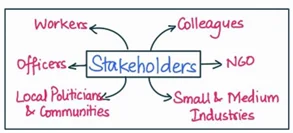Answer:
| Approach:
Introduction
- Shortly analyse the case study.
Body
- Options available to you under the given situation
- Critical examination of the options
- Mechanism to ensure environmental compliance
- Ethical dilemmas faced in exercising your options
Conclusion
|
Introduction:
The situation involves the enforcement of environmental compliance in a region with numerous small and medium industries. The industries are found to be violating environmental regulations, leading to health issues for the local population. The officer in charge is facing opposition from industrial units, vested interest groups, and politicians, while receiving support from colleagues and NGOs.

Body:
(a) Options available to you under the given situation:
- Enforce strict action and penalties against the non-compliant industrial units.
- Engage in dialogue and negotiation with the industrial units to encourage them to adopt environmentally-friendly practices.
- Seek support from higher authorities or government agencies to address the issue effectively.
- Collaborate with local NGOs and community members to raise awareness about the environmental impact and seek their cooperation in ensuring compliance.
- Implement a phased approach, giving the industrial units a specific timeframe to improve their practices gradually.
(b) Critical examination of the options:
Option 1: Enforce strict action and penalties against non-compliant industrial units.
Positives:
- Immediate enforcement can lead to compliance and deter future violations.
- Sends a strong message about the importance of environmental protection.
- Protects the health and well-being of local communities.
Negatives:
- May result in job losses and economic hardships for workers and owners.
- Can create hostility and resistance from industrial units.
- Immediate closures may lead to a shortage of products in the market.
Option 2: Engage in dialogue and negotiation with industrial units to encourage environmentally-friendly practices.
Positives:
- Allows for the possibility of cooperation and long-term changes.
- Provides an opportunity to educate and raise awareness about the environmental impact.
- Can build a relationship of trust and collaboration with industrial units.
Negatives:
- Negotiation may not guarantee immediate compliance.
- Some industrial units may resist or show reluctance to adopt environmentally-friendly practices.
- Requires willingness and commitment from the industrial units.
Option 3: Seek support from higher authorities or government agencies to address the issue effectively.
Positives:
- Provides leverage and resources to tackle non-compliance more effectively.
- Higher authorities can enforce stricter regulations and penalties.
- Can help overcome bureaucratic challenges and delays.
Negatives:
- May involve bureaucratic processes and delays in obtaining support.
- Reliance on higher authorities may limit individual decision-making power.
- Higher authorities may have competing priorities and limited resources.
Option 4: Collaborate with local NGOs and community members to raise awareness and ensure compliance.
Positives:
- Strengthens community engagement and involvement in environmental protection.
- NGOs can provide expertise, resources, and advocacy for compliance.
- Creates a collective effort towards environmental sustainability.
Negatives:
- Building consensus and cooperation among stakeholders may require time and effort.
- Dependence on NGOs and community support may vary based on their availability and capacity.
- Sustaining collaboration and engagement can be challenging in the long run.
Option 5: Implement a phased approach, giving industrial units a specific timeframe to improve their practices gradually.
Positives:
- Allows industrial units to make necessary changes without immediate economic disruptions.
- Provides time for workers and owners to adjust and adapt to new practices.
- Allows for monitoring and evaluation of progress during the phased implementation.
Negatives:
- Progress may be slow, and compliance may not be achieved within the desired timeframe.
- Requires continuous monitoring and enforcement to ensure progress.
- Critics may argue that gradual improvements do not adequately address the immediate environmental concerns.
(c) Mechanism to ensure environmental compliance:
- Establish a robust monitoring system to regularly assess the industrial units’ compliance with environmental regulations.
- Conduct regular inspections and audits to identify violations and non-compliant practices.
- Provide necessary training and awareness programs to industrial unit owners and workers regarding the importance of environmental compliance.
- Implement strict penalties and fines for non-compliance to create a deterrent effect.
- Encourage the adoption of sustainable and eco-friendly technologies and practices through incentives and rewards.
- Foster collaboration between the Environment Pollution Control Board, industry associations, NGOs, and other stakeholders to collectively work towards environmental protection.
(d) Ethical dilemmas faced in exercising your options:
- Balancing environmental protection with economic considerations and the potential impact on livelihoods.
- Dealing with resistance, hostility, and threats from industrial units and vested interest groups.
- Ensuring fairness and equal treatment to all stakeholders while upholding environmental regulations.
- Striving for long-term environmental sustainability while addressing immediate concerns and pressures.
Conclusion:
The case study highlights the challenges of environmental compliance and involves stakeholders such as the officer, industries, workers, politicians, local communities, colleagues, and NGOs. Balancing environmental protection and economic interests presents ethical dilemmas. Resolving the situation requires careful consideration and sustainable solutions.
![]() 2022
2022
![]() 0
0


Latest Comments